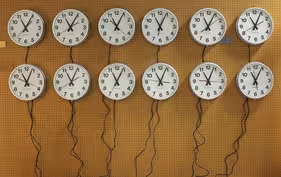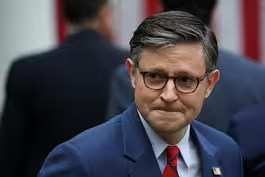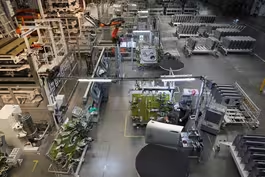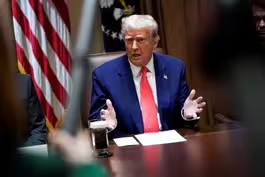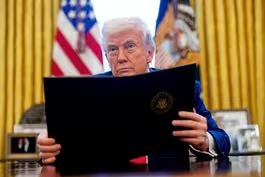
Food banks feel pain of high prices, government cuts
Clip: 4/10/2025 | 6m 22sVideo has Closed Captions
Food banks feel the pain from higher prices and cuts to government programs
President Trump's tariffs mean Americans can expect to see even higher prices on items ranging from coffee to fruits and cheese. It comes at a time when food banks nationwide are reporting record levels of need and after the USDA halted more than $500 million in deliveries to those food banks. Deema Zein reports.
Problems playing video? | Closed Captioning Feedback
Problems playing video? | Closed Captioning Feedback
Major corporate funding for the PBS News Hour is provided by BDO, BNSF, Consumer Cellular, American Cruise Lines, and Raymond James. Funding for the PBS NewsHour Weekend is provided by...

Food banks feel pain of high prices, government cuts
Clip: 4/10/2025 | 6m 22sVideo has Closed Captions
President Trump's tariffs mean Americans can expect to see even higher prices on items ranging from coffee to fruits and cheese. It comes at a time when food banks nationwide are reporting record levels of need and after the USDA halted more than $500 million in deliveries to those food banks. Deema Zein reports.
Problems playing video? | Closed Captioning Feedback
How to Watch PBS News Hour
PBS News Hour is available to stream on pbs.org and the free PBS App, available on iPhone, Apple TV, Android TV, Android smartphones, Amazon Fire TV, Amazon Fire Tablet, Roku, Samsung Smart TV, and Vizio.
Providing Support for PBS.org
Learn Moreabout PBS online sponsorshipAMNA NAWAZ: Despite data today showing an ease in inflation, President Trump's tariffs mean Americans can expect to see even higher food prices in the near future on items ranging from coffee to fruits to cheese.
That comes at a time when food banks nationwide are reporting record levels of need and after the U.S. Department of Agriculture last month halted more than $500 million in deliveries to those food banks.
Deema Zein reports.
DEEMA ZEIN: Empty shelves, an unusual scene in a normally stocked warehouse.
RADHA MUTHIAH, President and CEO, Capital Area Food Bank: What we were expecting to be about 55 tractor trailers' worth of food, and we just heard a couple of weeks ago that half of those will no longer be on their way to us.
DEEMA ZEIN: These vacant racks stand out in Washington, D.C.'s Capital Area Food Bank, a 123,000-square foot building where staff store inventory and pull orders for delivery to more than 400 regional partners.
Radha Muthiah is the food bank's president and CEO.
She says the recent USDA cuts made a deep impact here.
RADHA MUTHIAH: Six hundred and seventy thousand meals' worth of food that we now have to scramble to look for other sources of food to be able to try and at least partially bridge that gap.
I understand evaluating these programs.
Every administration does that.
We are happy to share data, client testimonials on the impact of these programs on working adults, on children who are able to focus more on school, on seniors who can combine this with food, with medication that they need.
DEEMA ZEIN: In February, food banks nationwide began noticing canceled USDA deliveries in their sums in their systems.
The funding freeze comes after the Trump administration cut two other programs that provide aid to food banks and schools.
Agriculture Secretary Brooke Rollins defended the cuts on FOX News.
BROOKE ROLLINS, U.S. Secretary of Agriculture: But right now, from what we are viewing, that program was nonessential.
It was an effort by the left to continue spending taxpayer dollars that were not necessary.
DEEMA ZEIN: Republican lawmakers are also considering cuts to the Supplemental Nutrition Assistance Program, or SNAP, previously known as food stamps.
Last year, about 42 million people used the program.
In a statement to the "News Hour," a USDA spokesperson said: "The USDA has not and will not lose focus on its core mission of strengthening food security, supporting agricultural markets, and ensuring access to nutritious foods."
The agency also noted a recent approval of $261 million in purchases of fruits, vegetables, and tree nuts to food banks.
VINCE HALL, Chief Government Relations Officer, Feeding America: This is an extraordinarily serious moment for food banks all across the United States.
DEEMA ZEIN: Vince Hall is the chief government relations officer for Feeding America, a nationwide network of more than 60,000 food pantries and distributors.
He says an end to pandemic era aid, rising inflation and stagnant wages has led to record high demand at food banks.
VINCE HALL: Any reduction in the supply of food to food banks is going to have very significant impacts for people facing hunger.
Food banks were already maxing out their supply chains.
They were already going to every conceivable donor, looking for every conceivable pound of food and asking every community to support.
And so the reality is, we're going to be short, we're going to be short on foods.
DEEMA ZEIN: Just outside Washington, leadership at Catholic Charities' Alexandria food pantry say they expect to see a drop in the variety and quantity of their USDA orders.
It's food that U.S. Army Reserve veteran Philip Tinsley relies on.
PHILIP TINSLEY, Food Panty Client: Well, it's important for your own health, but more important for, I guess, some of your mental health, that you don't think, well since I'm poor, I have to be treated like trash.
Or since I am poor, I have to eat bad food.
Or since I'm poor, I have to eat secondary food that other people don't want.
This is really what anyone would go and get off the shelves.
DEEMA ZEIN: And in this region, some food banks are starting to see more former federal workers enter their doors.
Tens of thousands of federal employees have been fired since the Trump administration took office, leaving some searching for ways to make ends meet.
WOMAN: This is my first time going to a food pantry as a client.
I have been a volunteer in the past.
DEEMA ZEIN: This former federal contractor was let go in mid-February and recently lost her health insurance.
She spoke to the "News Hour" anonymously for fear of retribution.
WOMAN: Coming here and admitting that I need some extra assistance took a bit of courage to having never been in this situation before.
I think it's important that people take a step back and take the politics out of it for a second and realize that these are real people's lives.
DEEMA ZEIN: And the need spans far and wide with some of the highest insecurity food insecurity rates in rural areas, like here in Rappahannock County, Virginia.
PENNY KARDIS, President, Rappahannock Food Pantry: We do not have any grocery stores nearby.
So for a family to be able to go and get fresh produce from a grocery store, they have about a 30-minute drive anywhere within the county.
DEEMA ZEIN: Rappahannock Food Pantry President Penny Kardis says they will look to their community to fill the gaps.
PENNY KARDIS: It would be a challenge for us.
We would have to -- besides looking at our current donors, we would possibly have to look at corporate donors.
That's a little bit difficult for us.
We have no businesses in the area, so that would -- we'd have to look really far outside for that.
DEEMA ZEIN: Sue Raiford has lived here for 30 years.
She says after a bad work accident about a decade ago, she could barely walk and weighed only 75 pounds.
SUE RAIFORD, Food Pantry Client: And when I went into the pantry, these people just surrounded me.
And they said, oh, we have got to fatten you up.
Here, here, here.
And it's been that type of welcoming companionship that is always here for everyone that walks through these stores.
DEEMA ZEIN: It's that community Raiford fears will be hurt as cuts are made to the programs many here rely on.
SUE RAIFORD: Like myself, many, many seniors, we don't have means to go out to the grocery stores.
We just can't do it.
I think without that support from the government, many lives will be shattered.
And that's the heartbreak.
DEEMA ZEIN: For the "PBS News Hour," I'm Deema Zein in Rappahannock County, Virginia.
Ditch the switch? Senators divided over daylight saving time
Video has Closed Captions
Clip: 4/10/2025 | 5m 14s | Ditch the switch? Senators debate future of daylight saving time (5m 14s)
House GOP passes budget framework to work on Trump agenda
Video has Closed Captions
Clip: 4/10/2025 | 4m 17s | House Republicans pass budget framework to begin work on Trump’s congressional agenda (4m 17s)
Musician Nile Rodgers reflects on the roots of his artistry
Video has Closed Captions
Clip: 4/10/2025 | 4m 23s | Musician Nile Rodgers reflects on the roots of his artistry (4m 23s)
Senegal struggles with climate despite promises of help
Video has Closed Captions
Clip: 4/10/2025 | 8m 37s | Senegal struggles to cope with climate change despite promises of help from other nations (8m 37s)
Trade war solution 'may take a while,' AEI's Scissors says
Video has Closed Captions
Clip: 4/10/2025 | 5m 50s | Solution to U.S.-China trade war 'may take a while,' AEI's Derek Scissors says (5m 50s)
Trump defends tariffs on China as markets take another dip
Video has Closed Captions
Clip: 4/10/2025 | 3m 59s | Trump defends enormous tariffs on China as markets take another dip (3m 59s)
Trump directs DOJ to investigate ex-administration officials
Video has Closed Captions
Clip: 4/10/2025 | 5m 26s | Trump directs DOJ to investigate former administration officials who criticized him (5m 26s)
Providing Support for PBS.org
Learn Moreabout PBS online sponsorship
- News and Public Affairs

FRONTLINE is investigative journalism that questions, explains and changes our world.

- News and Public Affairs

Amanpour and Company features conversations with leaders and decision makers.












Support for PBS provided by:
Major corporate funding for the PBS News Hour is provided by BDO, BNSF, Consumer Cellular, American Cruise Lines, and Raymond James. Funding for the PBS NewsHour Weekend is provided by...
